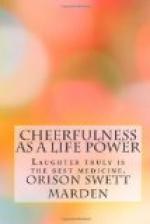OurHawaiian paradise.
A newspaper correspondent, Annie Laurie, has told us all about the new kind of American girls just added to our country:—
“They are as straight as an arrow, and walk as queens walk in fairy stories; they have great braids of sleek, black hair, soft brown eyes, and gleaming white teeth; they can swim and ride and sing; and they are brown with a skin that shines like bronze ... There isn’t a worried woman in Hawaii. The women there can’t worry. They don’t know how. They eat and sing and laugh, and see the sun and the moon set, and possess their souls in smiling peace.
“If a Hawaii woman has a good dinner, she laughs and invites her friends to eat it with her; if she hasn’t a good dinner, she laughs and goes to sleep,—and forgets to be hungry. She doesn’t have to worry about what the people in the downstairs flat will think if they don’t see the butcher’s boy arrive on time. If she can earn the money, she buys a nice, new, glorified Mother Hubbard; and, if she can’t get it, she throws the old one into the surf and washes it out, puts a new wreath of fresh flowers in her hair, and starts out to enjoy the morning and the breezes thereof.
“They are not earnest workers; they haven’t the slightest idea that they were put upon earth to reform the universe,—they’re just happy. They run across great stretches of clear, white sand, washed with resplendent purple waves, and, when the little brown babies roll in the surf, their brown mothers run after them, laughing and splashing like a lot of children. Or, perhaps we see them in gay cavalcades mounted upon garlanded ponies, adorned by white jasmine wreaths with roses and pinks. And here in this paradise of laughter and light hearts and gentle music, there’s absolutely nothing to do but to care for the children and old people and to swim or ride. You couldn’t start a ‘reform circle’ to save your life; there isn’t a jail in the place, nor a tenement quarter, and there are no outdoor poor. There isn’t a woman’s club in Honolulu,—not a club. There was a culture circle once for a few days; a Boston woman who went there for her health organized it, but it interfered with afternoon nap-time, so nobody came.”
When, hereafter, we talk about worrying women, we must take into account our Hawaiian sisters, if we will average up the amount of worry per capita, in our nation.
A weather breeder.
It is probably quite within bounds to say that one out of three of our American farming population, women and men, never enjoy a beautiful day without first reminding you that “It is one of those infernal weather breeders.”
Habitual fretters see more trouble than others. They are never so well as their neighbors. The weather never suits them. The climate is trying. The winds are too high or too low; it is too hot or too cold, too damp or too dry. The roads are either muddy or dusty.




